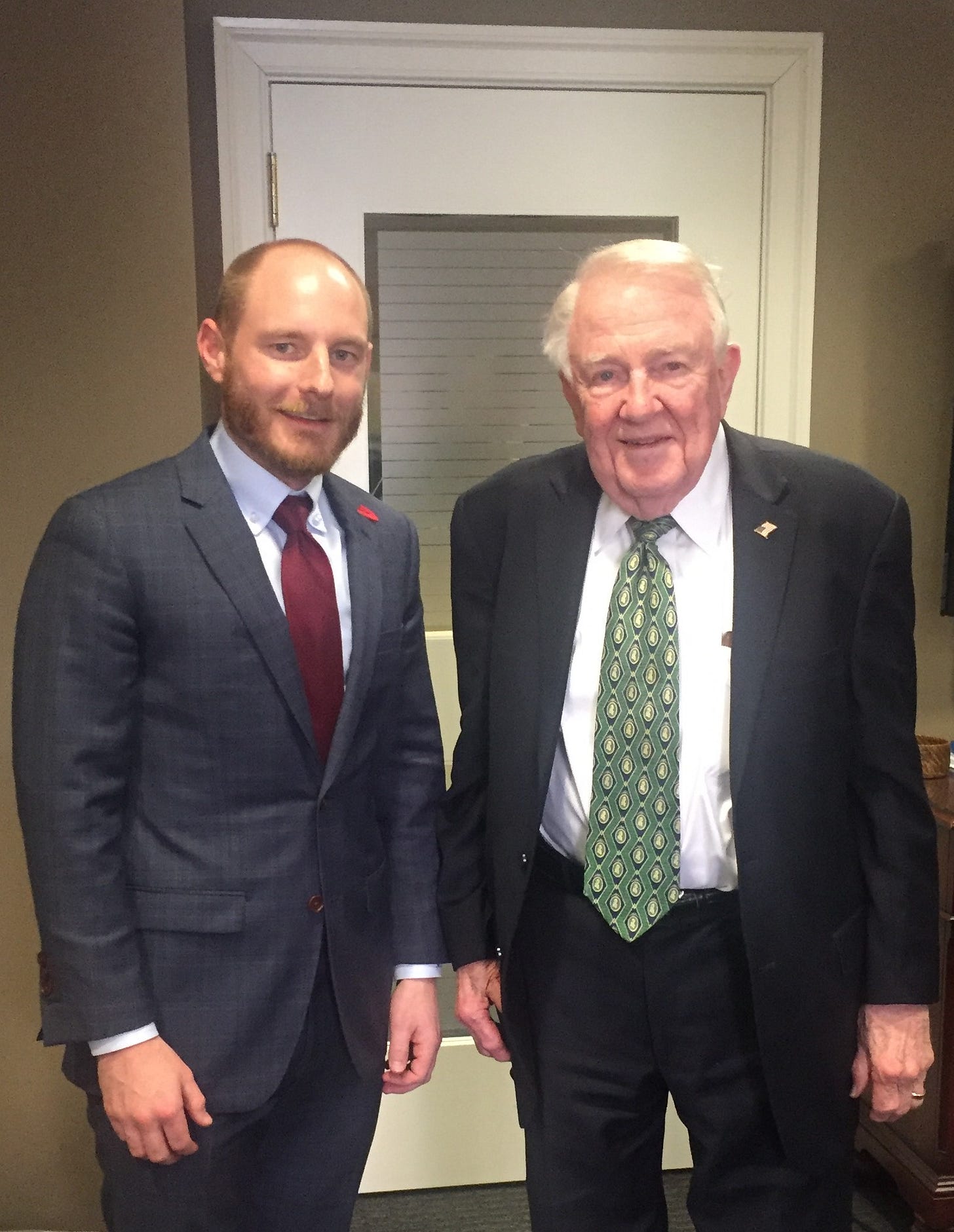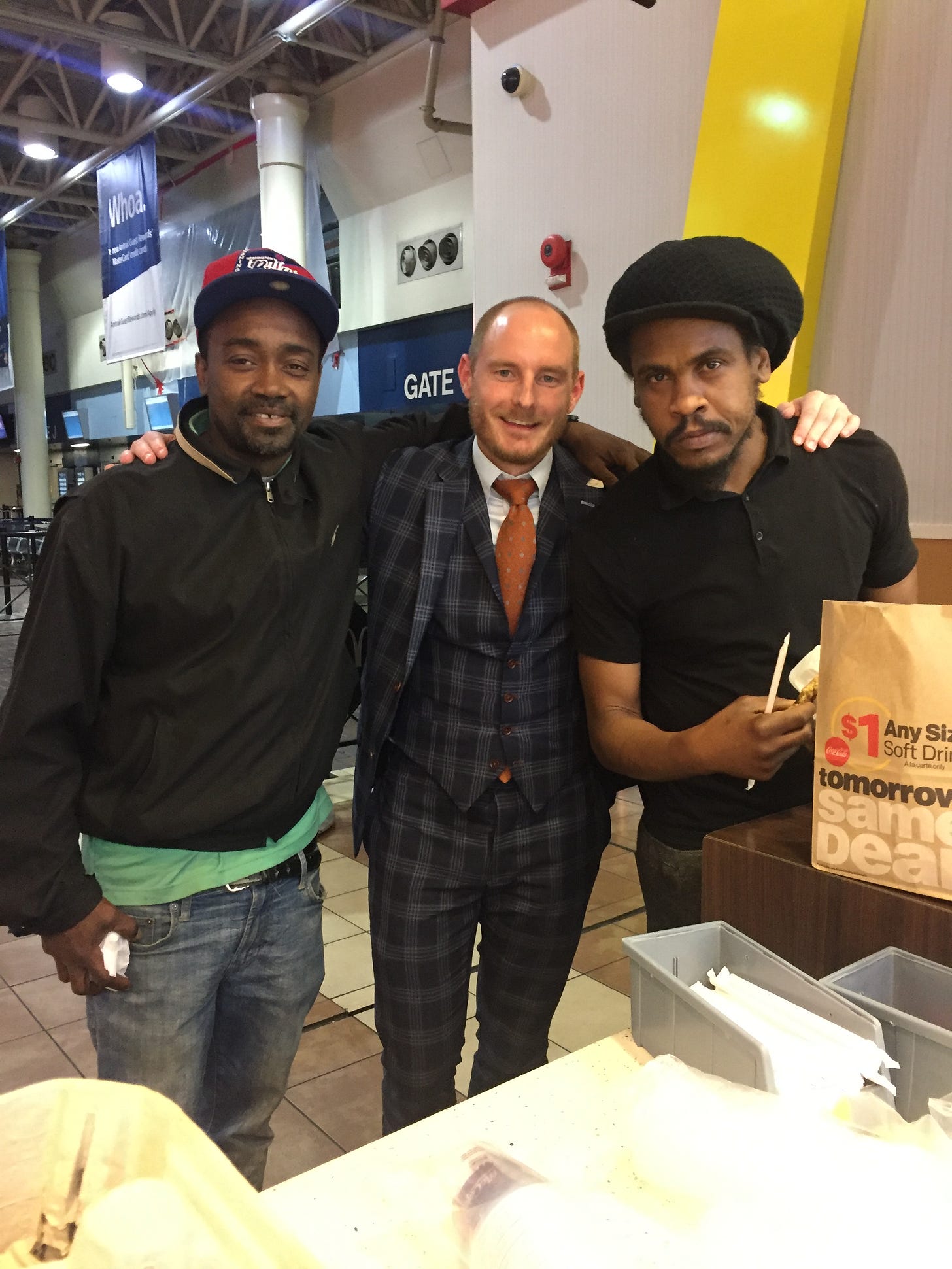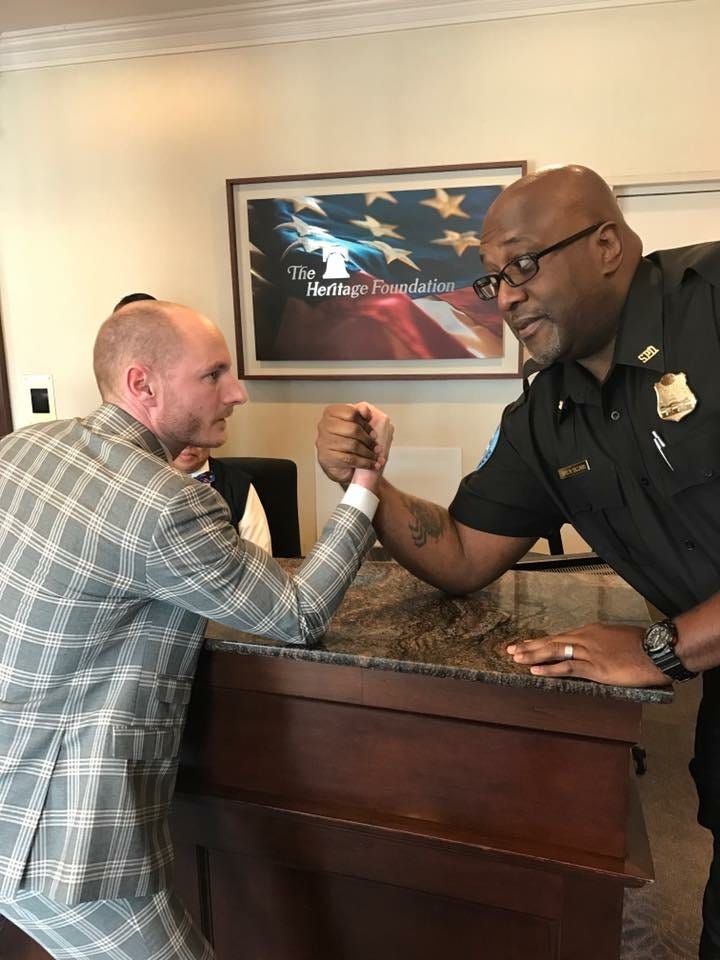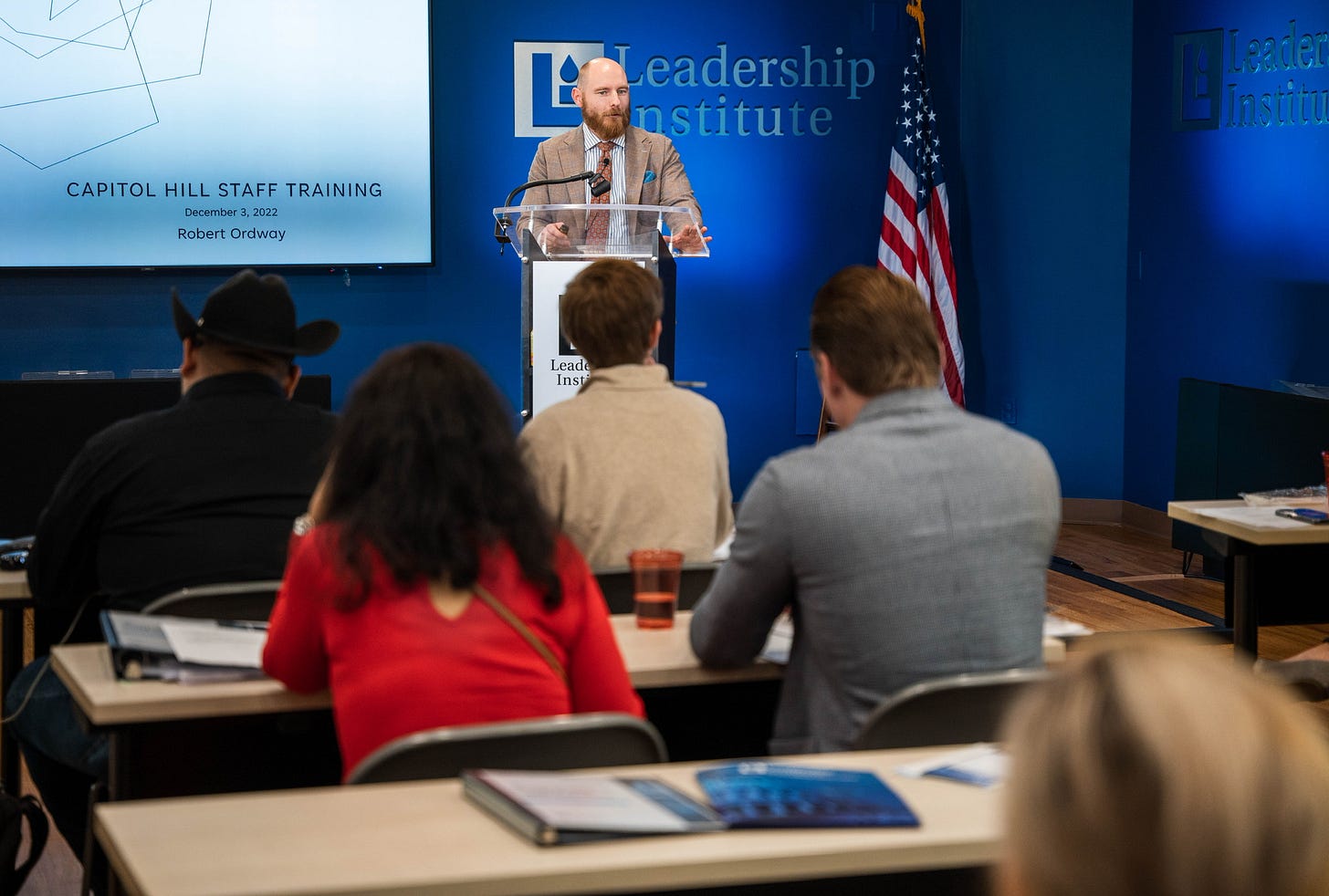Midnight McDonalds
What two months of unemployment in DC can teach you about yourself and others
It's hard to believe I've been in DC for almost eight years, but it’s time to head back to Indiana… for now.
I landed in January of 2017 as a Washington Scholars Program (WSP) Fellow within the legal center at The Heritage Foundation. While sounding prestigious, it was just a guaranteed position as an intern. Later, I learned from the folks running Heritage’s Young Leaders Program that hundreds of kids apply for those four spots every semester. The staff we worked under have some of the sharpest minds in the nation, if not the world.
With former Heritage Trustee, The Hon. Edwin Meese III
After shutting down my menswear retail store, I hit the reset button. I thought acquiring a full-time job in DC would be easy after Republicans won the House, Senate, and Presidency. I assumed wrong. Despite doing several “informational interviews” around Washington, the internship came and went, leaving me without a job. I was booted from intern housing a week later as they prepared for the next group of young leaders. I was unemployed for about 45 days through May and part of June, the longest since turning 18 in 2003. That period felt like an eternity, but it taught me much about myself.
During my quest for work, I also learned a lot about others, but the folks I hung out with late at night while job searching weren’t exactly Ivy Leaguers or politicos. In fact, they were the exact opposite, and that’s what I enjoyed about them.
For those of us with a productivity complex, being unemployed has to be one of the worst feelings. Not being able to make a meaningful contribution to society is depressing. However, W2 income shows our dependence on ‘the system.’ For thousands of years, men have been saying, “You only eat what you kill,” which is now the language of salesmen.
With that, I hung a shingle and started Capitol Hill Clothiers. I had a custom clothing certification from the CTDA in NYC but was unfamiliar with my manufacturer's measuring and fitting processes. The few sales I brought in the door from my limited network were less than profitable from all the remakes. I stuck it out because passion and perseverance go a long way, and menswear has long been part of my personal identity.
They say luck is when preparation meets opportunity. I took a page from my best friend’s insurance sales book, the One Card System. The science developed by the author is activity tracking: make 40 calls a day, 25 pick up, set appointments with 15, and keep 10. Of the ten you meet with, only three are actual prospects, and one will become a client. But of that one, 60% will become a client in the first year, 30% in year two, and the last 10% in year three. That’s a LOT of calls to build a client base. I used that same model to build a personal brand and secure a job.
With that activity, I averaged eight “informational interviews” per day in and around Capitol Hill. Other than graduating at the beginning of the Great Recession in December 2007, it was the hardest I have ever worked looking for a paycheck.
After grinding all day, meeting with people, and drinking around a gallon of coffee daily, the caffeine would set in hours later as I headed out to every evening Happy Hour (HH) possible. You can eat and drink in the city for free every night with the correct list. Just temper your expectations when it comes to quality. It was easy to network because, at the time, I was dressed to the nines in three-piece plaid, windowpane, and glen check suits with well-matching ties and shoes. People enjoyed hearing more about my work at Brooks Brothers and JCrew than talking about politics. So when people ask the repetitive DC question, “What do you do?” I just told them I was a haberdasher who liked politics.
Midnight McDonalds
When the party was over, I was always the last one standing. This stands in contrast to my lifelong 4:30 a.m. wake-up to be at the gym by 5. (see the book The 5AM Club) It was always well after midnight when I headed home. Pre-COVID, the McDonalds at Union Station was the only place open 24/7 where one could ball on a budget to prevent a hangover. In the wee hours of the morning, the panhandlers and homeless were always there waiting for me. They were disproportionately Black and male.
You could tell the other drunkards were scared of them because of the way they nervously approached the counter, waited at a distance, and then snapped up their food like an eagle coming out of left field. Perhaps I’ve watched American History X one too many times, or it’s the many years I spent working in Gary, but I’ve never felt unsafe around such a demographic.
My high school government teacher taught me the phrase, "There's no such thing as a free lunch.” I don’t remember the context of the quote but it stuck with me. Back when the dollar menu was a thing, I submitted to the food requests from these strangers on one condition: they had to eat with me. The inspiration came from the book Never Eat Alone. I firmly believe that ALL humans have time, treasure, and/or talent. I didn’t know these folks; I assumed they had no treasure, so I would take their time and learn about their talent.
Above, I mentioned the ‘hard skills’ of sales via activity. The ‘soft skills’ are all language-based. The key to learning how people tick is asking endless ‘why’ questions. For this group, I always started with: "Tell me how you got to where you are today."
With every person, I learn something new. The only unifying pattern I could recognize is that each had a defining event that sent them spiraling downward. A divorce, loss of job, family tragedy. Some of their challenges were started by drug and alcohol abuse, and others led to that pattern after the fact, compounding their situation. For the former, their use and abuse started as a coping mechanism from events that accumulated throughout their childhood.
Here I was, in the most powerful city in the world, one that never endures a recession, where government jobs and contractors can be created out of thin air on command for all walks of life but there’s an underbelly of folks that have fallen behind and are often ignored. A small percentage of society is probably best served by a caretaking institution, but most of the folks I met could benefit from remediation and/or rehabilitation. They just needed some stability and guidance…maybe even compassion and love.
There is a fork in the road when it comes to personal misfortunes. Some people are anti-fragile and actually get stronger from adversity, but others completely break and never recover. It is not clear to me if this is nature or nurture or a combination of the two. As a spectator to my Dad’s five-year battle with ALS, I wanted to give up many times – on myself, my family, and my community. It was ingrained every single day by Dad, even through his disease: failing was okay, but giving up was not.
Two of the many men I met at McDonald’s late at night while I pursued work in DC.
Accidental Courtesy
There is a racial parallel here. During unemployment, I came across a relatively new documentary, Accidental Courtesy: Daryl Davis, Race & America. Daryl was born the same year as my Dad and lived just a few miles apart (Chicago and Gary), but Daryl attended an international school as his dad was a foreign service officer. Like him, I grew up with a lot of people from different backgrounds where prejudice and racism weren’t a thing. I was also cognizant that various media sources tried to condition me to a stereotype that Gary, Indiana = poor, poor = Black, Black = crime, crime = bad, therefore Black = bad. My personal experience working in the city for over a decade says the opposite. It led to my 2015 op-ed in the NWI Times: Entire region has stake in Gary's future.
After returning to the U.S., Daryl experienced the sting of racism firsthand as a Black man and has since spent his life pursuing the question, “How can you hate me when you don’t even know me?” That led him to start meeting with KKK members to understand the root cause… the WHY of their hate. Like the Black men I met at Union Station, Daryl’s encounters with white men have a similar two-pronged theme. Some were born into a rural white existence and conditioned (via victimhood mentality) from the beginning that someone else is the source of their woes. Daryl also showed that one-time events like divorce can send a man spiraling, whereas the Klan provided meaning and purpose, leading to some irrational hate of some person or group he’s never met.
In a follow-up with a Black Lives Matter activist, Daryl explains that his goal is to change people's mindset through multiple meetings. Some of his sentiments are captured in Mindset: The New Psychology of Success.
I have stacks of books on masculinity, and it can not be stated enough how important it is for men to be associated with a (good) tribe. There is no such thing as a lone wolf. Whether it’s the rural whites joining the Klan or the inner city Blacks joining the local gang, in the absence of positive male influences, vulnerable men will follow anyone who is perceived to be a leader of men. Manhood in the Making: Cultural Concepts of Masculinity shows that this theme is universal worldwide and transcends religion, politics, and time.
Heritage has the best security. Wish I could say I won this arm wrestling contest with Ron.
Saul Alinksy & Community Organizing
When I lived in Lincoln Park, Chicago, during the Fall of 2008, there was a lot of euphoria surrounding presidential candidate Obama, so I read everything I could about him. His background as a community organizer led me to read both Rules for Radicals and Reveille for Radicals by Saul Alinksy. I enjoyed the latter regarding his approach to building “The Peoples Organization.”
Much like my native Lake County, Indiana, the southside of Chicago was inhabited by several ethnicities and races, many of whom hated each other for several reasons, one being economic security. Alinksy, a self-described ‘radical’ trashes the “overeducated (white) liberals” because they come into poor communities looking to fix problems from the top down with their one-size-fits-all program that dehumanizes people through questionnaires. They are ‘long on education, short on lived experience’. Instead, he believes in ‘native leadership’, finding the local person with such attributes and empowering them with whatever tools they need to solve local community issues.
Like Daryl and myself, Alinksy asks a lot of WHY questions to root out individuals' bigotry but he doesn’t judge them. Instead, he then uses that information to unify working-class people from various ethnic and racial backrounds by helping them focus on what they have in common. Through much of the 20th century, Big Business often preyed on this insecure group and used division to prevent unionization. Despite its legacy with racial challenges, there is an untold story of interracial solidary in Gary, Indiana, during the Steel Strike of 1919.
Conclusion
FUNemployment, as they call it, was not at all enjoyable but I learned a lot about myself in the process. With that, I wanted to pass on the experience to help others who are unemployed, between jobs or looking for their first one in DC. That insight led to me to speak multiple times to participants of Leadership Institute’s two-day program, Capitol Hill Staff Training. My three subtopics were how to Get to the Hill, what to do when you get there, and when to move up or move on. Since then, I’ve been able to apply those methods to other aspects of my life.
I learned even more about the men I spent time with at McDonalds. It reaffirmed that someone else always has it worse when times are tough, so be grateful. Additionally, I was reminded of the importance of showing others grace. We have no idea where people come from or what led to their current state. With compassion, it is our duty to help them get where they are going. Instead of assuming their condition or the solution to their problems, it takes humility to withhold judgment and first ask WHY.






Love that last picture and the never eat alone advice.
Engaging read! Safe travels and good luck with the move back!